| Spotlight
 Open-ended Dialogue with UGC Chair
Open-ended Dialogue with UGC Chair
It was Monday 26 May 2008. The venue was the office of The Daily Star. Star Campus, a weekly publication of The Daily Star, arranged a new and innovative concept for a policy maker to talk and share views with direct beneficiaries. University students from both institutions public and private were waiting eagerly. They were waiting to share their views with the chief executive of the overseeing body of all universities in Bangladesh, the Chairman of the University Grants Commission (UGC), Prof. Nazrul Islam. It was a rare and wonderful opportunity for all who were present that afternoon in the Conference Room of The Daily Star.
Professor Nazrul Islam came at 4:15pm. In spite of the incessant rain outside, the room was almost full by then. Shahnoor Wahid, on behalf of The Daily Star introduced the distinguished guest with the floor. From the moment go, the talk was informal. This feature describes the talk session between the Professor and the students.
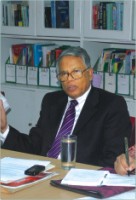 Professor Islam started with an introduction on what the UGC is and what its responsibilities include. The UGC was established in 1973. It is the statutory apex body for higher education in Bangladesh. It oversees 29 public universities; around 1800 colleges under the National University; the Bangladesh Open University; and 51 private universities. The UGC is responsible for supervising, maintaining, promoting and co-ordinating university education. The body further oversees the standard and quality of university education. The UGC determines standards of quality of the teachers and also the minimum grade a university applicant has to have for admission in private universities. UGC is also responsible for distributing government funds to universities in the public sector. Professor Islam started with an introduction on what the UGC is and what its responsibilities include. The UGC was established in 1973. It is the statutory apex body for higher education in Bangladesh. It oversees 29 public universities; around 1800 colleges under the National University; the Bangladesh Open University; and 51 private universities. The UGC is responsible for supervising, maintaining, promoting and co-ordinating university education. The body further oversees the standard and quality of university education. The UGC determines standards of quality of the teachers and also the minimum grade a university applicant has to have for admission in private universities. UGC is also responsible for distributing government funds to universities in the public sector.
The final responsibility of the UGC is to create an environment where universities in Bangladesh will be a centre for both quality education and a seat of knowledge creation and extension. This principal objective of the UGC started the debate between the Professor and the students.
The problem with university education in Bangladesh probably lies in the classic dilemma of quantity and quality control. University education is viewed as a social good. Not going into the finesse of definitions, a social good is simply a good that a society desires. Historically, social goods have been provided by the society, i.e., the State. Until 1992, this has been the scenario in Bangladesh with university education.
In spite of all our efforts, only 4 percent of the university going population (18-25 years) is currently enrolled in a university in Bangladesh. This figure is 13 percent for India and Pakistan and as high as 40 percent for Thailand. Even then, Bangladesh struggles with those who do enroll. In absolute figures, the public universities accommodate approximately 1,50,000 students; the National University another 800,000; and the Open University another 250,000. All the private universities accommodate around 1,30,000 students.
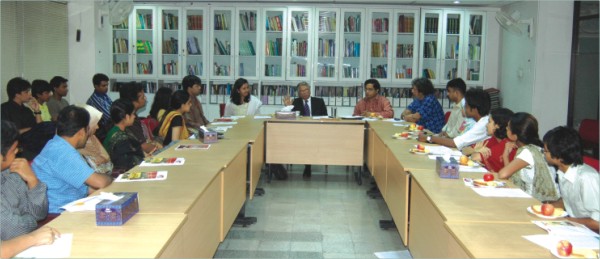
In spite of funds from the Government, public universities lack adequate funding and adequate infrastructure (physical and non-physical). Remuneration of teachers is low compared to their alternative in the private sector. Not receiving “efficiency wage”, teachers in the public sector are sometimes forced to look for part-time employment in the private sector. Professor Islam stressed on a mechanism to attract quality teachers in the public sector and create a secure environment. Students from public universities stressed on a mechanism whereby there is a limit to involvement of public sector teachers in the private sector.
Public universities have limited access and limited scope to raise finance outside funds generated from the Government.
Tuition fees in the public sector aren't rationalised by markets. Public universities, being a “social good”, are also obliged to provide transport; housing to students, faculty and staff; and other facilities besides education. It is true social goods like education usually generate positive external benefits for the society. It's also true such services aren't free and sooner or later will stress the coffer. Further dilemmas arise because increasing fees isn't socially or politically acceptable at times. Professor Islam stressed that the time has probably come that we debate on ways to find how public universities can achieve some kind of financial autonomy. Any policy, however, has to be somewhere in between a market and a social solution. The debate pointed to donations from generous citizens and alumni. This is a practice observed in even the richest universities in the world, Oxford, and Cambridge just to name a few.
Private universities face a different set of problems. Since private universities have to raise funds from own sources, they tend to emphasise subjects that have more of a market value than only a social value. They also tend to locate predominantly in Dhaka and/or where more affluent families live. Tuition fees can burden the budgets of the parents. High tuition fees can also totally discourage genuine meritorious students from the thought of applying for admission in a good private university. Professor Islam stressed that private universities should try to charge fees that are more socially acceptable. The UGC can come forward in debating ways to do so.
Although tuition fees in the public sector are extremely low, maintenance allowance can put burden on students and their families. Professor Islam stressed that both public and private universities should fund the full education of the truly meritorious students as much as possible so the truly meritorious need not worry about tuition fees and maintenance. Everybody appreciated this.
The discussion then went towards the grading policy. The grading policy differs between public and private universities and across public and private universities. It even varies within the same university and sometimes within the same department of a university. This sends mixed signals to the job market. Professor Islam mentioned that the UGC is trying to move towards a common grading policy for all universities in Bangladesh. Although the market has its own mechanism of finding which 'product' from which university or department 'could' be better in the job market, Professor Islam stressed on finding a method to rank universities and also departments and programmes of universities. We can learn from the experience of many countries where ranking exists.
A common grading policy took the discussion towards a common admission test. Public university students raised this issue. Students came up with the argument that if medical colleges in Bangladesh can have a common admission test, why not all public universities too? This would save time, money and hassle on students and their families. Professor Islam noted this as 'food for thought'.
The inevitable problem with public universities soon surfaced session jam and politicisation of the university administration. Professor Islam made one thing very clearall citizens have the right to express their political views, whether they are students or the teachers. Nevertheless, having said so, an institutional arrangement has to be reached where such political expression doesn't hamper academic activities of universities anywhere in Bangladesh. Things can't and won't change overnight, but Professor Islam assured that the UGC and the government are concerned about the issue just as much as are most teachers, students and guardians.
The talk then slowly focussed on quality of education. Although the UGC is an overseer of the quality of university education in Bangladesh, it's ultimately the universities themselves who have to address the issue.
This can be done through university associations and other formal platforms through periodic reviews. The civil society, other bodies and especially the media can also play positive roles. The government can also play its role towards both public and private universities. The UGC is exploring ways on how private universities can also receive funds from the Government. It's also high time we all think about providing e-library facilities in all universities with access to the Internet. Bangladesh can no longer afford the luxury of remaining immune from technological advantages that the Internet can offer.
A university is not only a seat of teaching, but also a centre for knowledge creation and knowledge extension. This is where both public and private universities have to come forward together. There are many good academics in public and private universities who are publishing in international journals and doing wonderful researches without patronage from their own universities. There are also wonderful teachers in public and private universities who are teaching for the love of the profession without caring much for any personal benefit. While mentioning this, Professor Islam stressed we have to have the heart to at least acknowledge these great minds, if not anything else. A light of hope came when the Professor mentioned the UGC is thinking on how to address this issue.
Universities in Bangladesh have the potential to specialise and expand graduate teaching through research. With guidance and assistance from the State or generous citizens and other philanthropic institutions, it is possible for universities in Bangladesh to expand their MPhil and PhD programmes. With some initiative it's very much possible for universities to develop link programmes with universities outside Bangladesh. This can address the brain drain problem and also save resources that would have been spent elsewhere.
The American economist Alchian once said, a society that proceeds is a society that allows scope for trial and error. Although Alchian never specified what 'trial and error' means, a civilised society proceeds through trial and error by debating. Through debates come new ideas. Through new ideas the time comes to realise old concepts have to make room for the new if the society wants to proceed forward. A debate becomes productive when institutions and their beneficiaries sit together as friends to exchange views and learn from each other.
The dialogue at the Daily Star that day was unique. Public and private university students met with one common goal to discuss how to improve university education in Bangladesh. The dialogue became a blue moon because they interacted directly with Professor Nazrul Islam. The Professor set an example for our policy makers. Good things can come out through dialogue and debate with direct beneficiaries of a service. After just three hours on the dot, Shahnoor Wahid wrapped up the fruitful interactive session. He thanked the distinguished guest on behalf of The Daly Star for taking time out of his busy schedule. He also thanked the students for braving the inclement weather to be here that afternoon.
The audience had nothing to offer but appreciation and a big round of applause. Those who were present in that room that day will tell, the applause came from the hearts of the future generation of Bangladesh that was inspired by a person from the previous generation. Everybody left the room to get back into the rain, but everybody left with 'food for thought' from the wonderful dialogue. Even the Professor!
(Students came from Dhaka University, BUET, Jahangirnagar University, Chittagong University, Khulna University, AUST, NSU, IUB, Stamford University, Victoria University, BRACU, Jahurul Islam Medical College, UODA, Dhaka College)
(Asrarul Islam Chowdhury teaches economics at Jahangirnagar, and North South Universities)
An Adda at Star Campus
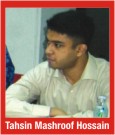
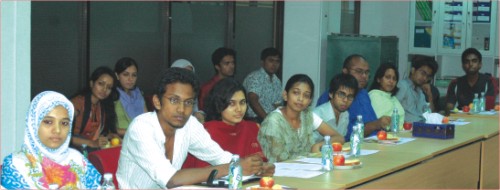
Being an undergraduate student in Bangladesh, can you imagine yourself sitting right next to the UGC Chairman, Prof. Nazrul Islam telling him this and that? Well, I actually did so! On 26th May I enjoyed such an opportunity at the Daily Star office where more than 50 students from both public and private universities sat on the same platform to exchange their views with Professor Nazrul Islam. In the stories of the 1,001 Arabian Nights I used to read as a child that the mighty Sultans sometimes called common people for face-to-face conversation. I found my experience quite similar to that. Being just an undergraduate student I was literally sitting beside the “Big-Boss” of university education in Bangladesh!
My experience at the dialogue was quite different from what I had expected. Professor Islam is so senior to us and holds such a distinguished position. I thought he would be extra cautious and might not welcome our ideas or open up sufficiently. To my utter surprise, I found him exactly the opposite. Apart from discussing general issues like the duties of the UGC and listening to our thoughts, he even came up with some of his own ideas, which I found fascinating. For example, it was quite amazing to hear him saying- “Providing a topstudent with full tuition waiver is not enough.
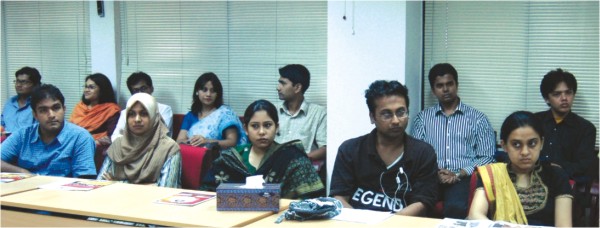
 We must make sure that s/he can enjoy little luxuries like watching a movie, or buying a nice T-shirt.” At the SAARC Meeting of the UGC Chairmen he proposed maintaining a minimum requirement of professional degrees equal throughout the region. If this is successful, it will create easy entrance for South Asians in job markets of SAARC. This would open up doors for all countries of the SAARC. Professor Islam also stressed that all university students should engage in community work to give back something to the common people who indirectly pay for their studies. All of us listened excitedly to Professor Islam. We must make sure that s/he can enjoy little luxuries like watching a movie, or buying a nice T-shirt.” At the SAARC Meeting of the UGC Chairmen he proposed maintaining a minimum requirement of professional degrees equal throughout the region. If this is successful, it will create easy entrance for South Asians in job markets of SAARC. This would open up doors for all countries of the SAARC. Professor Islam also stressed that all university students should engage in community work to give back something to the common people who indirectly pay for their studies. All of us listened excitedly to Professor Islam.
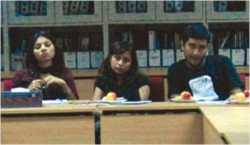 As students from both the public and private universities were present, the pros and cons of both the institutions were discussed. What I liked most about Professor Islam is that he encouraged us to interact with each other more frequently to come out of stereotyped conceptions. As students from both the public and private universities were present, the pros and cons of both the institutions were discussed. What I liked most about Professor Islam is that he encouraged us to interact with each other more frequently to come out of stereotyped conceptions.
His down-to-earth manners and well-chosen words inspired us to be united despite our tiny differences and emulate what his generation did in 1971. However, this time giving birth to an economically emancipated Bangladesh.
(Final Year Undergraduate Department of Economics , North South University)
All photos by Shafiqul Alam
Professor Nazrul Islam
Chairman, University Grants Commission of Bangladesh (UGC)
Professor Nazrul Islam was born at Shariatpur in 1941. He was educated at Nawabpur Government High School, Dhaka College, and Universities of Dhaka, Western Ontario and London. Professor Islam served as a faculty in the Department of Geography at the University of Dhaka from 1963 till 2007. Meanwhile, he taught at the Asian Institute of Technology (AIT) and has been a visiting scholar at universities and research institutes in the UK, Sweden, the Netherlands, Denmark and India. Professor Islam has been the Chairman of the University Grants Commission (UGC) from 7 May 2007.
Professor Islam is one of the leading urban researchers in Bangladesh. He is the founder and honourary chairman of the Centre for Urban Studies (CUS). He was the Chairman of the Dhaka WASA. He is the life member of many reputed national and international scholarly bodies. He has authored or co-authored more than 25 books and has printed solo or in collaboration in more than 100 articles in international journals. He is also an eminent art critique. Professor Islam is married and has two daughters.
Copyright
(R) thedailystar.net 2008 |

